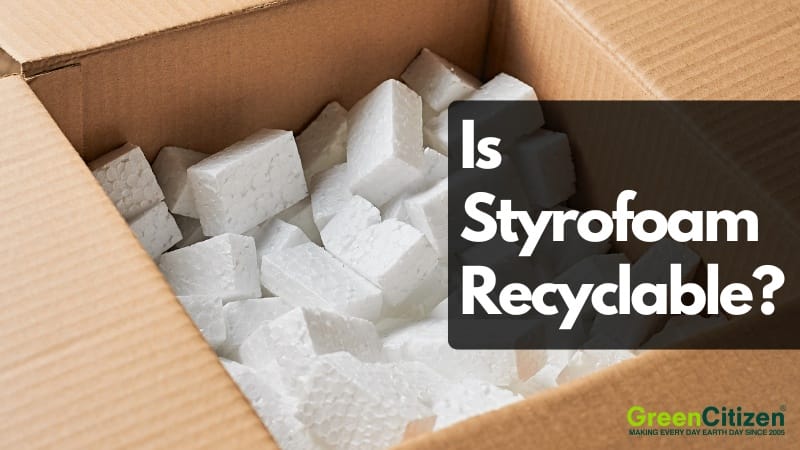Styrofoam is everywhere—think takeout containers, egg cartons, coffee cups, and those bulky packaging blocks that come with electronics. It’s light, cheap, and convenient… until you try to get rid of it.
Is Styrofoam recyclable? Technically, yes. But for most people, the answer might as well be no. That’s because Styrofoam (a type of polystyrene foam) isn’t accepted in most curbside recycling programs. It’s too lightweight, too bulky, and too easily contaminated.
To recycle Styrofoam properly, you’d need to find a specialized drop-off location that accepts clean, dry, and tape-free foam. Otherwise, it’s headed to a landfill, where it can linger for hundreds of years—adding to the growing plastic waste crisis.
So why is polystyrene recycling so complicated? And if your local recycling center won’t take it, what’s the responsible way to dispose of Styrofoam? Let’s unpack your options.
Key Takeaway: Is Styrofoam Recyclable?
Styrofoam is technically recyclable, but not through curbside bins. Only clean, dry #6 EPS foam is accepted at specialized recycling centers. Most contaminated foam ends up in landfills. To recycle properly, find a local drop-off or use services like GreenCitizen. For better sustainability, switch to compostable or biodegradable Styrofoam alternatives.
Can You Recycle Styrofoam?
Yes, Styrofoam is technically recyclable—but only under strict conditions and at specialized recycling centers. Most curbside recycling programs do not accept Styrofoam because it’s difficult to collect, expensive to transport, and hard to process.
When people talk about Styrofoam, they’re usually referring to expanded polystyrene (EPS), labeled as #6 plastic. Although EPS can be recycled, it’s made of 95% air, which makes it bulky and inefficient to handle. That’s why most local recycling centers lack the equipment to process it.
Some municipalities offer dedicated Styrofoam drop-off programs, but they’re rare. Even when accepted, the EPS must be clean, dry, and free of food residue, tape, labels, or protective films. If it’s contaminated, it’s sent straight to a landfill.
There’s also another material often confused with EPS—low-density polyethylene (LDPE) foam, also known as #4 plastic. This flexible packaging foam is even less commonly recycled and is accepted only by a handful of specialty recyclers.
If you’re wondering how to recycle Styrofoam, your best option is to locate an EPS recycling center in your area that accepts uncontaminated material. Use resources like the Green Directory to find responsible drop-off locations near you.
Note: There is no proper way to recycle #4 Styrofoam or Low-Density Polyethylene foam (LDPE/PELD). The best option is to reuse them as much as possible. If that’s not possible, you need to send them to landfills.
What Is Styrofoam?
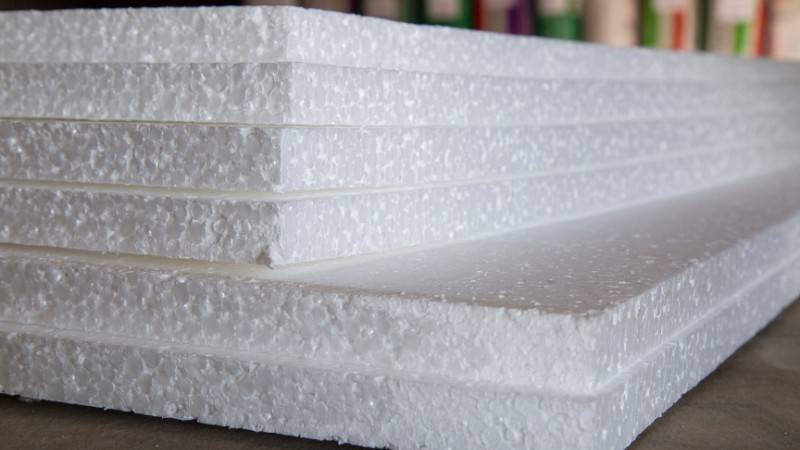
Styrofoam is a trademarked closed-cell extruded polystyrene foam (XPS) produced by the Dow Chemical Company and introduced to the US market in 1954. It’s most commonly used as insulation for walls, roofs, and foundations.
Nowadays, Styrofoam also refers to different polystyrene foam products (the same way we use Kleenex to refer to different tissue brands).
The white, rigid, crunchy stuff we use most commonly is technically expanded polystyrene foam or EPS. It’s most commonly found in the food industry for takeout containers, single-use plates, and cups. Another common use is as packing peanuts.
Overall, EPS is everywhere and has a wide variety of uses. It’s commonly denoted by the recycling symbol #6.
Why Is Styrofoam Difficult to Recycle?
Styrofoam Recycling Is Expensive
Styrofoam is mostly air. It’s big, bulky, and difficult to transport because it takes up a lot of room. Also, Styrofoam is expensive to recycle. Some estimates show it costs $3,000 to recycle one ton of Styrofoam (on the other hand, it costs less than $100 to recycle one ton of paper).
Recycling Styrofoam is costly because it requires specialized machinery to compress the material into dense blocks. The high cost of these machines exceeds the market value of recycled Styrofoam, making the process financially unviable for many recyclers.
Also, most local recycling centers don’t have the necessary equipment for Styrofoam recycling, so it has to be sent to a centralized plant, which makes the whole process very costly.
Finally, even with the necessary equipment, it’s difficult to revert Styrofoam to its basic form.
The Issue of Styrofoam Contamination
Styrofoam is porous. Contaminated Styrofoam can’t be recycled, which means takeout containers and cups end up in landfills. Also, it’s extremely difficult to completely clean Styrofoam food containers. You also need to remove any stickers, dirt, or sellotape before taking Styrofoam to be recycled.
Moreover, if you throw Styrofoam into the recycling bin, you risk contaminating the entire bin. This can lead to your recycling being rejected when it arrives at the recycling facility.
Finally, EPS has harmful chemicals. If they are broken down during the recycling process, the toxins can end up in products we use every day.
Can’t Be Reused In the Food Industry
Recycled Styrofoam can’t be reused for products that come in contact with food. Styrofoam is sterilized during the recycling process and is often used to make packaging for other materials. However, there are health concerns over it, and only new EPS can be used for food packaging. Essentially, this reverses the positive impact of Styrofoam recycling.
This also leads to the lack of demand for recycled Styrofoam and is another obstacle to having widespread Styrofoam recycling.
How GreenCitizen Recycles Styrofoam
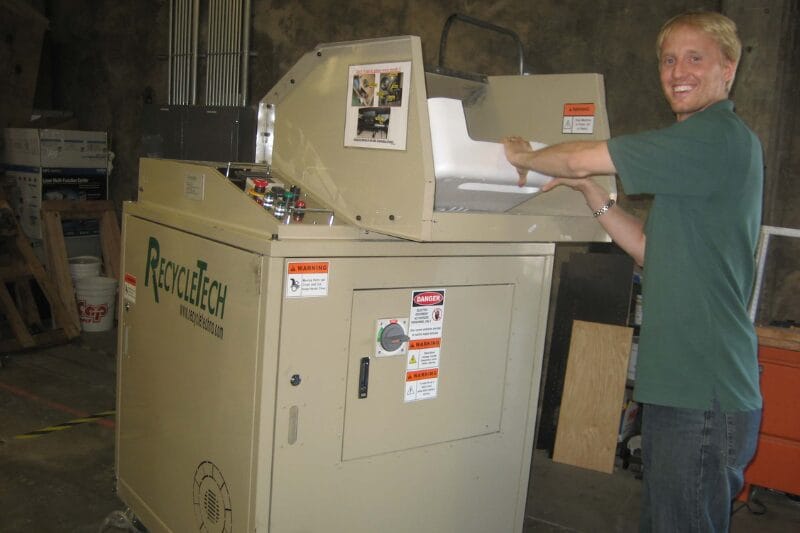
At GreenCitizen’s Burlingame EcoCenter, we specialize in recycling Styrofoam #6 (Expanded Polystyrene or EPS) using an advanced thermal densification process that ensures discarded foam is turned into valuable materials rather than ending up in landfills.
Step-by-Step Styrofoam Recycling at GreenCitizen
- We only accept Styrofoam #6 EPS, commonly found in packaging materials, insulation, and protective foam.
- Before recycling, Styrofoam must be clean, dry, and free of labels, glue, tape, or any protective film made of other materials. Food containers cannot be accepted due to contamination.
- Individuals can drop off Styrofoam at our Burlingame EcoCenter from Monday to Friday, 10 AM – 6 PM.
- Businesses with large amounts of Styrofoam can schedule a recycling pick-up service.
Note: We charge $5 per 30-gallon bag of Styrofoam.
2. Shredding & Thermal Densification
- Once collected, the Styrofoam is fed into our Plastic Foam Densifier (PFD) XT200 machine.
- This shreds the foam into small pieces, increasing its surface area for further processing.
- The shredded EPS then undergoes thermal densification—it’s heated to soften and collapse into a denser form without burning.
- The material is then pressurized into ingots or blocks, reducing its original volume by up to 1/90th.
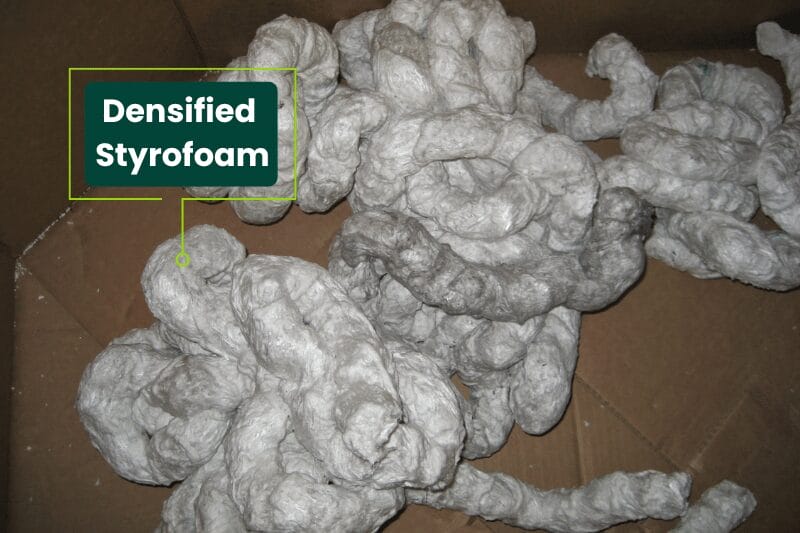
3. Processing Into New Materials
The densified Styrofoam is processed into polystyrene pellets, which manufacturers use to create new plastic products. These materials are repurposed into insulation panels, ceiling moldings, construction materials, surfboards, public benches, toys, plant pots, cameras, and more.
Some Styrofoam can also be mechanically chopped, cleaned, and turned into recycled plastic resins (rLDPE or rPS), which are used in new product manufacturing or blended with virgin plastic resins.
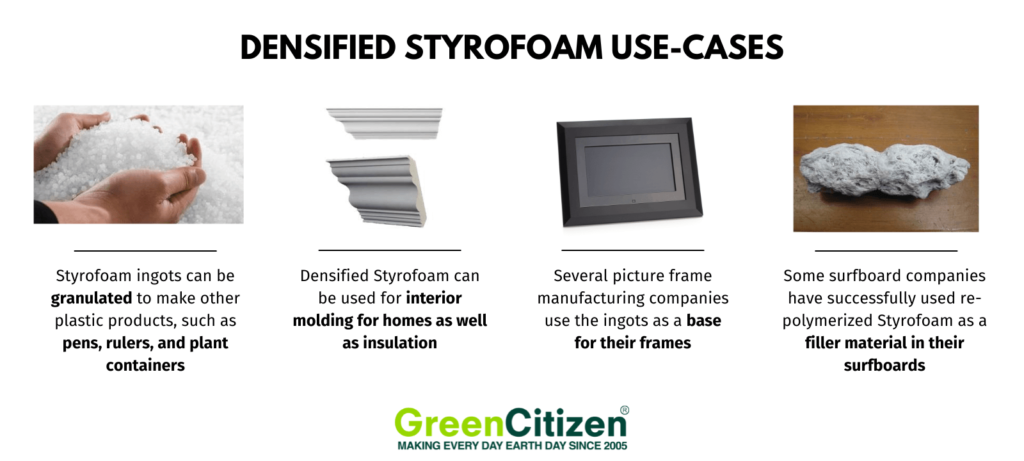
Why GreenCitizen’s Styrofoam Recycling Is Unique
- No Landfill or Incineration – Unlike traditional disposal methods, we ensure that EPS is fully recycled into reusable materials
- Local Processing – We process foam locally, significantly cutting down transportation emissions.
- Energy-Efficient Recycling – Our thermal densification method minimizes waste and emissions.
- Circular Economy Approach – We collaborate with manufacturers and businesses to reintegrate densified foam into production, reducing the demand for virgin plastic.
- Convenient Drop-Off & Pick-Up – We make Styrofoam recycling accessible for both individuals and businesses with easy drop-off locations and scheduled pick-up services.
Understanding the Environmental Impacts of Styrofoam
Styrofoam has a hugely negative impact on the environment.
1. Takes up Space in Landfills
Styrofoam fills up 30% of total landfills worldwide. This is hugely problematic as landfills are fast becoming full.
Over a thousand tons of styrofoam is buried in US landfills each day, and billions of styrofoam cups from stores and restaurants end up in landfills and cause pollution. It’s estimated that the US will run out of landfill space in about 15 years.
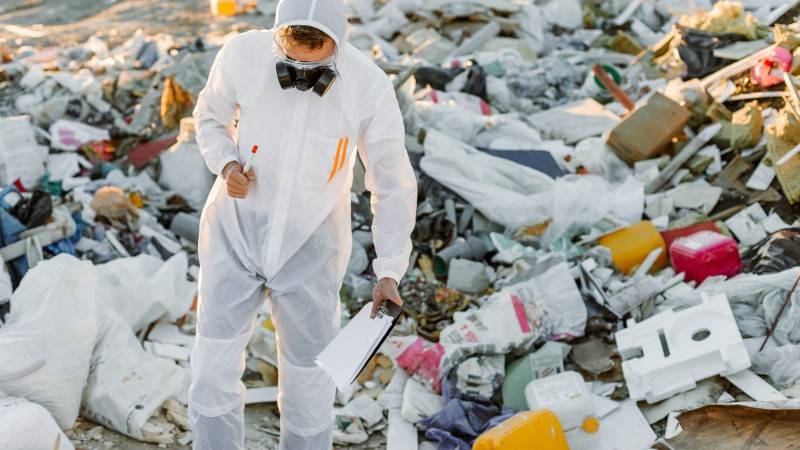
2. Releases Toxic Pollutants
Styrofoam releases harmful air pollutants that contaminate landfills and impact the ozone layer. Moreover, styrofoam production also releases toxic pollutants. The manufacturing process releases 57 chemical byproducts, which cause both respiratory and environmental issues.
One of these byproducts is styrene, which is a carcinogen and irritates the skin, eyes, respiratory, and gastrointestinal tracts. Moreover, styrene can react with nitrogen oxides in the air and produce ground-level ozone, which is another toxic pollutant that impacts the lungs and leads to respiratory issues.
This is why many cities have banned the commercial use of styrofoam such as Seattle, Washington, Toronto, Paris, Portland, and more.
3. Animal Impact
Styrofoam harms animals that scavenge for food in landfills. It easily breaks apart into small pieces that can choke animals.
Moreover, styrofoam impacts sea animals. It’s extremely light, so it floats, and there are large amounts of styrofoam accumulated around coastlines.
4. Decomposes Slowly
Styrofoam biodegrades extremely slowly. It takes from 500 to one million years to decompose naturally. Moreover, it’s resistant to photolysis, which is decomposition by light.
Styrofoam is extremely stable because its atoms are bonded to one another. This strong stability makes it resistant to water, acids, bases, and salts, which ensures its long shelf life and makes it cost-effective for businesses.
However, the main downside to this chemical stability is that it takes ages to break down and remains in landfills for generations.
Styrofoam Alternatives That You Should Try
As more and more cities and states are imposing a ban on styrofoam, there’s a rise in styrofoam alternatives.
Here are our best styrofoam alternatives you can use every day.
1. Biodegradable Peanuts
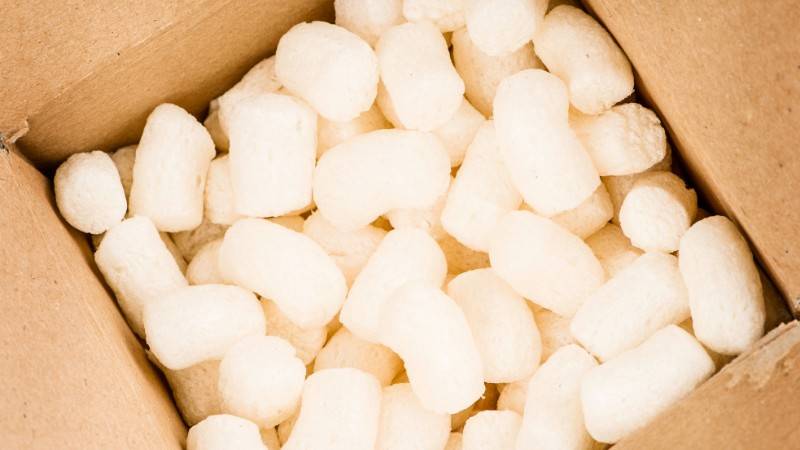
Biodegradable peanuts are made of non-toxic corn starch or wheat. You can add these packing materials to your compost piles.
Biodegradable peanuts are a great eco-friendly replacement for styrofoam peanuts. Use them as bubble wrap to fill the void in containers or boxes.
There are several companies that manufacture biodegradable peanuts, and you can buy options such as:
- Static-free organic starch peanuts (there’s no electric charge, so they won’t stick to your clothes)
- Peanuts that decompose in water, so there’s no toxic waste left behind
These peanuts are even edible, but they don’t have nutritional value. However, their main drawback is that they are heavier than styrofoam peanuts, which means higher shipping costs. Also, they are more expensive to manufacture and take up space that could be used for food production.
2. Corrugated Bubble
Corrugated bubbles are another great substitute for bubble wrap. They are made of 100% recycled cardboard from post-consumer and post-industrial waste.
Plus, there’s an option to buy a corrugated bubble to your exact specifications. Once you no longer need it, it’s 100% recyclable and biodegradable.
3. Bamboo Packaging
Bamboo packaging is made of bamboo pulp, which is just like paper pulp. Bamboo pulp is made using only bamboo pulp or combined with wood pulp and straw pulp.
This packaging has high mechanical strength — it won’t tear easily. Businesses can use it for commercial purposes and put stamp printing paper or other advanced paper on it.
4. Crinkle Paper
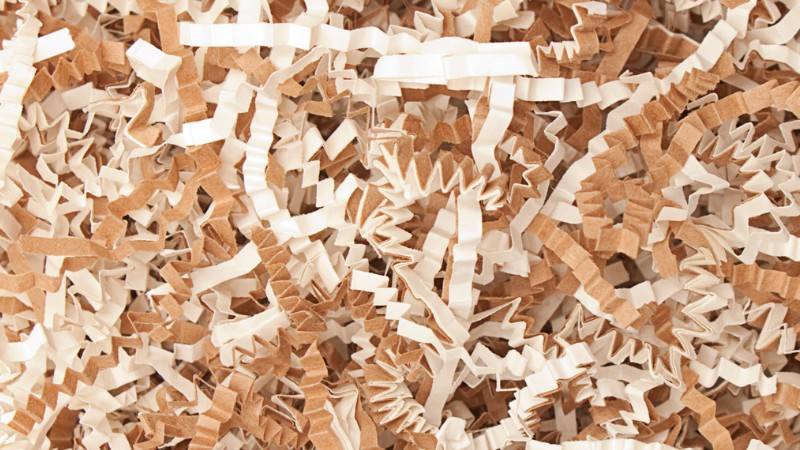
Crinkle paper is another bubble wrap alternative. You can use it to fill the void for baskets or gift boxes.
It comes in different colors, so it’s a great eco-friendly alternative to celebration streamers.
5. Mushroom Packaging
The vegetative part of a mushroom fungus and crop waste is used to make this product. It may seem funny, but large retailers, such as Ikea, are seeing its strengths and are using it instead of polystyrene.
This packaging contains mycelium, which decomposes in weeks. The result is less waste and better recycling.
6. PLA-Lined Paper
PLA or Polylactic Acid lined paper is a great substitute for styrofoam food packages. This is a plant-based resin made from corn starch. It can be used to make compostable food containers and cup liners. It’s resistant to water damage and can be used with hot and cold products. You can even use it in a microwave or the oven.
However, its main drawback is poor heat transfer. For example, a styrofoam cup protects you from getting burned, but a PLA-lined cup will get hot.
7. Mineral Filled Polypropylene
Mineral-filled polypropylene products have 50% less plastic compared to standard polypropylene products. They are made with mineral content, which reduces the amount of plastic required and can be used for both hot and cold food.
However, these products don’t completely eliminate the need for plastic. Plus, they aren’t recyclable.
Frequently Asked Questions (FAQ)
No, you should not put Styrofoam in your curbside recycling bin. Most recycling programs do not accept Styrofoam—especially food containers, cups, and packaging foam.
You can dispose of large Styrofoam at a dedicated recycling center like GreenCitizen, where we compress it down to 1/90th of its original size.
You can recycle Styrofoam at home if there is a curbside recycling program in your area that allows you to put it in the recycling bin. You may also donate it to delivery persons that come to your door since they might be able to repurpose it as packing peanuts.
You can help turn old Styrofoam into many everyday items, including surfboards, ceiling molding, and coat hangers, if you recycle it at a dedicated center.
You can destroy Styrofoam by dissolving it with acetone but be warned that it’s dangerous from a health and environmental standpoint because doing so can release toxic carcinogens into the air.
Yes, Styrofoam egg cartons can be recycled if you take them to a specialized recycling center like GreenCitizen. In some cases, you can put them in a recycling bin, but only if your local government has a curbside recycling program.
No, vinegar will not dissolve Styrofoam because vinegar is not hot nor concentrated enough.
Acetone will dissolve Styrofoam, though it’s still not ideal for the environment, and it becomes difficult if you’ve got a lot to dispose of.
Choose the Responsible Way to Handle Styrofoam Waste
Styrofoam isn’t just hard to recycle—it’s built to last forever, and that’s the problem. Most curbside bins reject it, and contaminated foam goes straight to landfill.
But you’ve got better options: recycle clean EPS at certified drop-off points, reuse what you can, and choose compostable alternatives next time.
Small switches add up fast.

